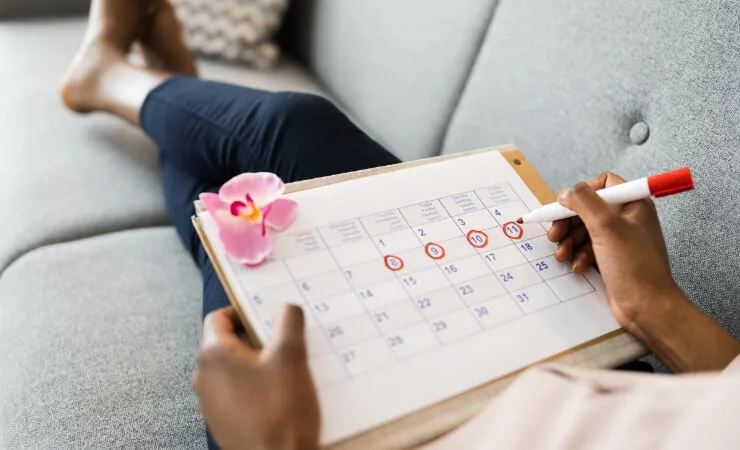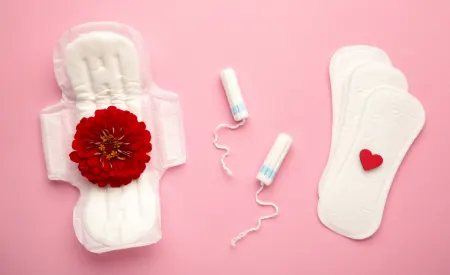Why Is My Period Early? Here Are 7 Common Early Periods Causes

Imagine this, you feel something iffy down there, so you head to the washroom. Only to find out that a not-so-pleasant guest has arrived already. Yes, it’s your period! While most women worry about late or irregular periods, early periods can also leave them a little concerned.
No matter how early you experience a period, be it 2 weeks or 3 days early, your mind immediately runs in different directions. It wants to know why your period came early and what needs to be done to get your cycle back on track. Well, slow down! Right from explaining the causes of an early period to ways of managing early periods, we’ve covered it all! Keep on reading to learn more.
What Does An Early Period Mean?
The meaning of the early period is that your periods would arrive before the estimated date. It is essentially is the outcome of fluctuations in your hormonal levels. It could be caused due to several reasons which we will be discussing shortly. This hormonal fluctuation is caused particularly in the initial months when you start getting your periods.
Are Early Periods Normal?
Typically, a woman experiences a 21 to 39 days of menstrual cycle. As everyone’s body is different, these days tend to vary. However, if you notice your cycle is shorter than 21 days i.e if your periods came early, it needs to be assessed. It’s because early periods can be a sign of an underlying condition in a few cases.
Causes Of Early Periods

As mentioned earlier, early periods sometimes can be linked to some other condition. Therefore, it's essential to know the causes of early periods. Here are some of the most common ones to watch out for:
1. Puberty
Puberty in girls is a stage in life wherein your body transitions physically and emotionally. At the same time, it starts producing reproductive hormones like oestrogen and progesterone. These hormones tend to keep fluctuating in the initial years after you get your first period. All of which may cause you to experience your period a week or 2 weeks early.
Treatment: Puberty is a natural part of life. It doesn’t require any treatment. In case you have further doubts about puberty, consulting a doctor is the best option. If your daughter has precocious or delayed puberty, your doctor is likely to suggest hormonal therapy.
2. Polycystic ovary syndrome (PCOS)
Another common cause of experiencing a period 2 weeks or 3 days early is polycystic ovary syndrome (PCOS). The cause behind this condition is yet to be known. However, factors like hormonal imbalance or insulin resistance play a key role in PCOS. It can cause early periods or even missed or delayed periods, along with acne, weight gain and hair loss.
Treatment: The doctor will likely recommend birth control pills to regulate your cycle. At the same time, making modifications in your daily lifestyle with balanced diet and regular workouts, can also help you manage PCOS.
3. Sexually Transmitted Infections (STIs)
Gonorrhoea, chlamydia, and syphilis are some of the sexually transmitted infections that typically do not project any symptoms. But when they do, they lead to vaginal bleeding or spotting between periods. So, what you might mistake for early periods is actually spotting. It can also cause yellow or green vaginal discharge, pain during intercourse or pain while urinating.
Treatment: STIs can be treated with antibiotics. When it comes to managing vaginal discharge, using pantyliners is a great option. Try the ALWAYS Extra Protect Pantyliners which have extra-long size for extra coverage. It is also equipped with odour-neutralising technology that keeps you fresh and confident. Likewise, these pantyliners are dermatologically tested and safe for the skin.
4. Perimenopause
This is the stage where your body prepares itself to enter menopause. You are likely to experience this condition in your late forty or early fifties. In this stage, your hormones, especially follicle-stimulating hormone (FSH) keep fluctuating more than ever. This causes irregular and sometimes early periods too.
Treatment: It’s a natural process and doesn’t require any treatment. However, you can seek medical help to ease out other symptoms associated with perimenopause which include hot flashes, vaginal dryness, and cramps.
5. Hormonal Birth Control
“Got my period a week early while on the pill”, if this is one of your concerns, here’s what you need to know. Hormonal birth control pills influence your ovulation and menstrual cycle. Sometimes, as a side effect, it can cause breakthrough bleeding which looks like spotting between periods and makes you think your periods came early. Breakthrough bleeding occurs especially when you are inconsistent at taking your birth control pills or switch to a new form of birth control.
Treatment: Consult a doctor and understand whether stopping the pill or switching to a lower dose or other contraceptive option would help or not.
6. Endometriosis
In this condition, endometrium-like tissue grows outside the uterus. Typically, in your ovaries or fallopian tubes. It can make your uterine lining shed more than ever and cause heavier periods and shorter menstrual cycles. It can bring your period 2 weeks or a week early than your estimated date.
Treatment: Medications can help you ease the pain caused by this condition. In severe cases, a surgery can be performed.
7. Thyroid disease
Underactive or overactive thyroid tends to influence your bodily functions including your menstrual cycle. Women with thyroid conditions are likely to experience early periods which could be lighter or heavier than usual. In a few cases, it can also stop your periods.
Treatment: Talk to your doctor as he might require you to run a few tests. Upon assessment, he would prescribe some medicines. In severe cases, surgery might be the solution.
Apart from the above-mentioned causes of early periods, factors like stress, change in body weight or an intense workout can also make your periods arrive early.
Implantation bleeding Vs Early Periods
It can be quite tricky to differentiate between implantation bleeding and early periods. However, here are a few things that might give you some clue:
- Implantation bleeding typically lasts for 1-3 days and is pinkish-brown in colour. On the other hand, a period would last for 4-7 days and would start with light pink colour which in few days turns crimson red.
- You would experience implantation bleeding in an interrupted pattern whereas periods would have a consistent flow.
- If you notice clots while bleeding, it’s a sign of period blood. It’s because implantation bleeding doesn’t consist of a mix of blood and tissue.
How To Manage Early Periods?

While your doctor helps you navigate through the causes of early periods, here are a few things that you can do to manage early periods at your end:
1. Relax:
Stress can hamper your menstrual cycle. So, it becomes essential for you to manage your stress. Try meditating or going for a walk. Take a vacation occasionally to rest.
2. Stay Prepared:
As you don’t know when your early period symptoms might kick in, it's best to stay prepared. Make sure to stock up on the best sanitary pads and tampons. Try the ALWAYS Maxi Thick Pads which have an extra-absorbent core and unique anti-leakage barriers which keeps you well-protected. Its comfortable Flexi pillow makes you feel confident and light throughout the day. It is also armed with high Flexi wings that keep your pad in place and give you a worry-free movement. For tampon lovers, ALWAYS TAMPAX Cardboard Tampons are a great pick. It has an innovative absorbent core that perfectly soaks up the menstrual discharge. To make things easier, these tampons have an anti-slip applicator. Lastly, it is also equipped with a protective skirt that minimises the risk of leakage.
3. Track Your Cycle:
Tracking your cycle can help you know how early your periods arrive in comparison to the previous one. This information proves to be important while consulting a doctor. You can use the ALWAYS Period Calculator to get an estimation of your next period date.
4. Exercise In Moderation:
It’s important to stay active. However, excessive workouts can make your periods arrive early. So, take it slow. Opt for moderate workouts that suit your body type.
5. Aim For Healthy Weight:
Maintaining a healthy weight can help you manage your periods better. So, start working out in the gym or opt for yoga, Zumba or any other physical exercise that doesn’t strain you too much but at the same time, keeps your weight in check.

When To See A Doctor?
Early periods are usually manageable and get rectified in one or two cycles. However, here are a few scenarios under which seeking medical attention is a must:
- Experiencing severe discomfort while menstruating
- Excessive vaginal bleeding
- Suspecting a miscarriage
- Pain during intercourse or while urinating
Takeaway
For most of the time, your cycle goes back to being regular with a few lifestyle changes. However, if you notice any irregularities in your period cycle, flow or timings, or if you develop any unusual symptoms, it's best to check in with your doctor.
FAQS
1. What can cause your period to come early?
Here are some of the common causes of early periods:
- Puberty
- PCOS
- Endometriosis
- STIs
- Thyroid
- Perimenopause
- Birth Control Pills
- Stress
- Intense Workout
- Being overweight
2. What are early period symptoms?
Early period symptoms are quite similar to your usual period symptoms which are as follows:
- Cramps
- Acne
- Sore breasts
- Mood swings
- Bloating
- Headache
3. Can you get your period a week early on birth control pills?
Yes, when you are on a birth control pill, you can get your period a week early. It’s because birth control pills contain hormones that fluctuate your hormonal levels and disrupt your ovulation plus menstrual cycle. This leads to early or delayed periods.
Disclaimer:
Please note the date of the last review or update on all articles. No content on this site, regardless of date, should ever be used as a substitute for direct medical advice, diagnosis or treatment from your doctor or other qualified clinician. Always is committed to ensuring that all of our products meet rigorous safety standards; Always pads prioritize safety, protection and comfort of its consumers.




